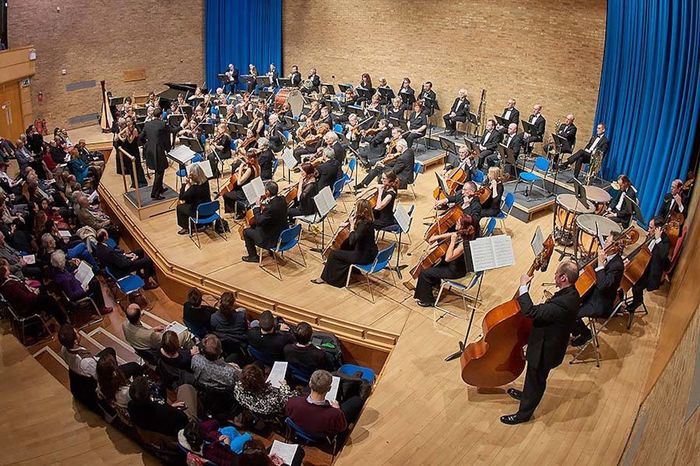Classical legends Magdalena Kožená and Mitsuko Uchida enchant at Peterhouse Theatre
Albert Koch was transported by the duo’s performance of evocative songs of love and mystery

This term’s classical concert season kicked off with yet another standout offering from Camerata Musica, a Peterhouse society hosting chamber music concerts for students and the public. The legendary pianist Dame Mitsuko Uchida returned to Peterhouse Theatre for the eighth time to accompany Czech mezzo-soprano Magdalena Kožená in a performance of songs by Debussy and Messiaen. During the interval, I overheard an elderly man saying to his wife in German that the accompaniment was what really mattered. And, certainly, having someone of Uchida’s calibre play in such a private setting was truly a spectacle. However, Kožená’s bewitching performance kept me closely listening to the poetic and fantastical songs of love and mystery.
“She claimed the centre of the stage, from which her warm voice radiated like a dreamy invocation”
As the concert started, she claimed the centre of the stage, from which her warm voice radiated like a dreamy invocation. Uchida, almost at the edge of the limelight, sat firmly and concentrated at the piano to provide the songs with their harmonic scenery. Of course, her playing itself was a ravishing experience, the accompaniments being full of such fundamental complexity and melodious ideas.
With the Songs of Bilitis, the duo transported the audience into the imagined mythical setting that poet Pierre Louÿs created in his pseudo-translation of non-existent ancient Greek poems. Debussy placed these poems within an impressionistic musical landscape, conjuring up the encounter of a young flutist and her flute teacher. Flowery and insinuating tensions, a daydreamer’s longing visions, and a hallucinatory journey through the wasteland ending at the tomb of the Naiads were the opening scenes that led us astray into the mysterious realms of this poetic soirée.
“Uchida’s piano part comprised countless curious harmonies and irregular rhythms”
Another of Debussy’s song cycles engaged with the melancholic world of Paul Verlaine, which Kožená’s florid voice opened up for us as Uchida produced a vivid atmosphere that evoked the poet’s sorrows. One of the songs contemplates profound heartache in connection to particularly dismal weather, with the sparkling piano part recalling falling raindrops: “ll pleut dans mon cœur comme il pleut sur la ville” (“tears fall in my heart as rain falls on the town”). How else could we have been released into the interval than with a helpless exclamation of “hélas!” (“alas!”), which adequately summed up the lovelorn and world-weary sentiment that permeates these Forgotten Songs.
The second half opened with the night’s final compositions by Debussy: five poems from Charles Baudelaire’s famous collection Les Fleurs du mal. While as symbolistic as the previous pieces, these songs were more tender and romantic in their language and more voluptuous in their music. Debussy’s phase of admiration for Richard Wagner when he composed this cycle led him away from his loose and wafting impressionism. This manifested in the total sweetness of these sensual songs, which concluded with ‘Death of the Lovers.’
At this point, the concert transitioned into a celebration of life. When his wife was pregnant, 20th-century composer Olivier Messiaen wrote a set of poems and put them to music, amiably naming them Poems for Mi after his wife’s nickname. These enigmatic love songs, inspired by New Testament scenes, pious as Messiaen was, stirred up the audience after it had been lulled into the perfumed reverie of 19th-century Parisian romanticism. Uchida’s piano part comprised countless curious harmonies and irregular rhythms – as well as birdsong – while Kožená sang these wondrous prayers with an ethereal voice.
The final song grew ever more frantic, spilling over into a powerful climax of a final utterance, “La joie est revenue” (“Joy has returned”), which stood victorious against the more pessimistic conclusion to the concert’s first half. After a lengthy plaudit, Kožená announced an encore by Leoš Janáček, a nostalgic Moravian folk song about an old bench that two lovers used to sit on but has now split like they have. In this way, Kožená balanced a distinctly French programme with an enchanting taste of her Moravian homeland, thus concluding a dreamy and lyrical musical event and another great return of Mitsuko Uchida to Cambridge.
 News / Candidates clash over Chancellorship25 April 2025
News / Candidates clash over Chancellorship25 April 2025 Interviews / Dr Ally Louks on going viral for all the wrong reasons25 April 2025
Interviews / Dr Ally Louks on going viral for all the wrong reasons25 April 2025 Music / The pipes are calling: the life of a Cambridge Organ Scholar25 April 2025
Music / The pipes are calling: the life of a Cambridge Organ Scholar25 April 2025 News / Cambridge professor paid over $1 million for FBI intel since 199125 April 2025
News / Cambridge professor paid over $1 million for FBI intel since 199125 April 2025 Arts / Plays and playing truant: Stephen Fry’s Cambridge25 April 2025
Arts / Plays and playing truant: Stephen Fry’s Cambridge25 April 2025






